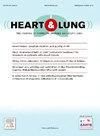Depression, mutuality, and self-care behaviors in patients with heart failure and their caregivers: An actor–partner interdependence model extended to mediation
IF 2.6
4区 医学
Q2 CARDIAC & CARDIOVASCULAR SYSTEMS
引用次数: 0
Abstract
Background
Mutuality may serve as a protective factor against depression for both patients with heart failure (HF) and their caregivers. Mutuality, a sense of positive interaction, is associated with better self-care for HF patients and for lower levels of depression. The mechanism linking mutuality to improved self-care and lowered depression is unclear.
Objectives
To examine whether mutuality, the quality of interactions between HF dyads, functions as a mediator in the association between depression and self-care behaviors.
Methods
A cross-sectional study was conducted among 202 HF dyads from two university-affiliated tertiary hospitals in Seoul, South Korea. Dyadic data were analyzed by the actor–partner interdependence model extended to mediation analysis. We tested whether depression influenced HF self-care behaviors and caregiver contributions through mutuality. Mutuality, measured via self-reported perceptions from both dyad members, was assessed as a potential mediator at both individual and dyadic levels.
Results
Patients’ depression had significant direct effects (actor effects) on their own self-care behaviors (β = -0.61, 95 % confidence interval (CI) = –1.22 to –0.12) and caregivers’ contribution to self-care behaviors (partner effects) (β = –0.92, 95 % CI = –1.65 to –0.19). Patients’ mutuality mediated the association between patients’ depression and self-care behaviors (β = –0.27, 95 % CI = –0.57 to –0.07). Caregivers’ mutuality mediated the relationship between caregivers’ depression and contribution to self-care behaviors (β = –0.26, 95 % CI = –0.61 to –0.01).
Conclusion
Mutuality may serve as a protective factor against depression in HF dyads. The relationship quality in HF dyads should be assessed, with psychosocial interventions implemented to enhance dyadic self-care behaviors.
心衰患者及其照顾者的抑郁、相互关系和自我照顾行为:一个行动者-伴侣相互依赖模型扩展到中介
背景:对于心力衰竭(HF)患者和他们的照顾者来说,相互关系可能是防止抑郁的保护因素。相互性,一种积极互动的感觉,与心衰患者更好的自我保健和较低的抑郁水平有关。相互关系与改善自我照顾和降低抑郁之间的联系机制尚不清楚。目的探讨心力衰竭患者相互作用的质量是否在抑郁与自我照顾行为之间起中介作用。方法对韩国首尔两所大学附属三级医院的202例HF患者进行横断面研究。对二元数据进行分析,将参与者-伙伴相互依赖模型扩展到中介分析。我们测试了抑郁症是否通过相互关系影响HF自我护理行为和照顾者的贡献。相互性,通过两组成员自我报告的感知来衡量,被评估为个体和两组水平的潜在中介。结果抑郁症对患者自我护理行为的直接影响(行为人效应)(β = -0.61, 95%可信区间(CI) = -1.22 ~ -0.12)和照顾者对自我护理行为的贡献(伴侣效应)(β = -0.92, 95% CI = -1.65 ~ -0.19)显著。患者互动性在患者抑郁与自我护理行为之间起中介作用(β = -0.27, 95% CI = -0.57 ~ -0.07)。照顾者相互性在照顾者抑郁与自我照顾行为贡献之间起中介作用(β = -0.26, 95% CI = -0.61 ~ -0.01)。结论相互关系可能是心衰患者抗抑郁的保护因素。应评估心衰双性恋的关系质量,并实施社会心理干预以增强双性恋的自我保健行为。
本文章由计算机程序翻译,如有差异,请以英文原文为准。
求助全文
约1分钟内获得全文
求助全文
来源期刊

Heart & Lung
医学-呼吸系统
CiteScore
4.60
自引率
3.60%
发文量
184
审稿时长
35 days
期刊介绍:
Heart & Lung: The Journal of Cardiopulmonary and Acute Care, the official publication of The American Association of Heart Failure Nurses, presents original, peer-reviewed articles on techniques, advances, investigations, and observations related to the care of patients with acute and critical illness and patients with chronic cardiac or pulmonary disorders.
The Journal''s acute care articles focus on the care of hospitalized patients, including those in the critical and acute care settings. Because most patients who are hospitalized in acute and critical care settings have chronic conditions, we are also interested in the chronically critically ill, the care of patients with chronic cardiopulmonary disorders, their rehabilitation, and disease prevention. The Journal''s heart failure articles focus on all aspects of the care of patients with this condition. Manuscripts that are relevant to populations across the human lifespan are welcome.
 求助内容:
求助内容: 应助结果提醒方式:
应助结果提醒方式:


